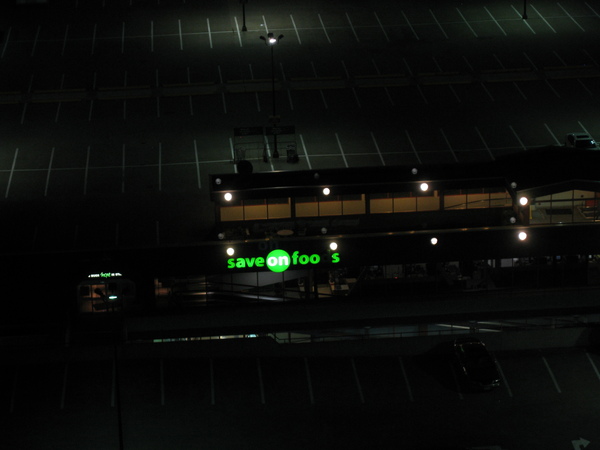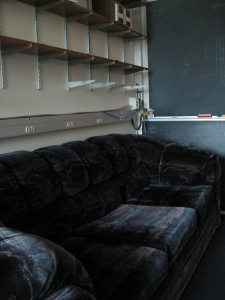Letter to Minister Bardish Chagger
28 Jan 2016
Letter to Minister Bardish Chagger
Dear Minister Chagger,
I am writing to you as one of your constituents.
I know that multiculturalism is important to you from your past involvement with the KW Multicultural Centre. Given yesterday’s deplorable news from the United States about a ban on Syrian refugees, we in Canada absolutely must take up the slack as best we can. I understand that we’re accepting a number of Syrian refugees already; way less than Germany, but more than the US, and that this number continues to increase and is slated to be higher in 2017 than in 2016. However, we’re not doing enough.
Two Views of Columbia Crest Crater (Mount Rainier)
1 May 2013
Shot above (July 8, 2009): at 14,400 ft (route to summit: Emmons-Winthrop Glacier) with David Wentzlaff and Aaron Yahr; shot below (May 1, 2013): at 36,000 ft, from AC 545 flying from LAS to YVR.
Engineering failures in real life
30 Jun 2009
So here I am staying in a hotel in Burnaby BC. Outside my window I can see a “Save-on-Foods”. Hmm. Let’s see. Save-on-Foods. Burnaby. Wait! I remember something from the Professional Practice Exam book! [edit 2020: This was well before the Algo Centre Mall collapse in Elliot Lake.]
OK, so is that the Save-on-Foods in question? Google Maps tells me that my hotel is 0.3km from the Save-on-Foods in Station Square, as described below.
Travel options from Waterloo
6 Aug 2008
Travel options from Waterloo
I’ve tried to figure out various options for carless transportation from Waterloo. Here’s what I’ve discovered.
To Pearson Airport
- Airways Transit option 1, door-to-door: 1.5hr, $80 for one direction. You have to wait for everyone to get on and off. They do tend to drive at reasonable highway speed.
- Airways Transit option 2, Airporter: 2 hours from the UW Student Life Centre, limited schedules (departs 6am, 10:45am, 1:00pm, 3:30pm; returns 8:15am, 1:30pm, 3:15pm, 6:13pm) and even less on weekends. $46 per direction.
- Greyhound to Toronto ($22, 1.5 hours) and Pearson airport express ($20). About the same cost as the Airporter, but more hassle and more schedules available. Cheaper if you have a student card.
- Get to Mississauga Square One (works if you can take the FEDS bus) and then take the GO service to the airport ($3.50). Can be extremely cheap, if you can make it work for you, and probably isn’t all that slow either.
To Buffalo Airport
All reasonable options cost about $65.
Academic Tree circa 2003
26 Jun 2008
Pull requests accepted!
https://github.com/patricklam/plam.new-webpage
Henry M. Foley (physics)
+--Joseph Frederick Traub (1959, from Columbia) [Columbia] (quantum)
http://www.cs.columbia.edu/~traub/
+--Hsiang Tsung Kung (1973, from CMU) [Harvard] (networks)
http://www.eecs.harvard.edu/~htk/
+--Baudet, Gerard M. (78, from CMU)
+--Cohn, Robert J. (92, from CMU)*
+--Fisher, Allan L. (84, from CMU)
+--Foster, Michael J. (84, from CMU)
+--Hsu, Feng-hsiung (89, from CMU)
+--Lam, Monica S. (87, from CMU) [Stanford]
+--Michael Wolf, (August 1992, from Stanford)
Thesis: "Improving Parallelism and Locality in Nested Loops".
+--Michael Smith (November 1992, from Stanford) [Harvard]
Thesis: "Support for Speculative Execution in High-Performance
Processors".
+--Todd Mowry (March 1994, from Stanford) [CMU]
Thesis: "Tolerating Latency Through Software-Controlled Data Prefetching".
+--Martin Rinard (August 1994, from Stanford) [MIT]
Thesis: "The Design, Implementation, and Evaluation of Jade,
a Portable, Implicitly Parallel Programming Language"
+---Pedro Diniz (May 1997, from UCSB) [ISI]
Thesis: "Commutativity Analysis: A New Analysis Framework
for Parallelizing Compilers"
+---Radu Rugina (January 2002, from UCSB) [Cornell]
+--Daniel Scales (December 1995, from Stanford) [VMWare]
Thesis: "Efficient Shared Objects for Distributed Address Space Machines"
+--Saman Amarasinghe (January 1997, from Stanford) [MIT]
Thesis: "Parallelizing Compiler Techniques Based on Linear Inequalities"
+--Jennifer Anderson (March 1997, from Stanford) [VMWare]
Thesis: "Automatic Computation and Data Decomposition
for Multiprocessors"
+--Robert Wilson (December 1997, from Stanford) [Tensilica]
Thesis: "Efficient Context-Sensitive Pointer Analysis for C Programs"
+--Jason Nieh (December 1998, from Stanford) [Columbia]
Thesis: "The Design Implementation and Evaluation of SMART:
A Scheduler for Multimedia Applications"
+--Shih-wei Liao (August 2000, from Stanford) [Intel Research]
Thesis: "SUIF Explorer: an Interactive and Interprocedural Parallelizer"
+--Brian Schmidt (August 2000, from Stanford) [Kealia]
Thesis: "Supporting Ubiquitous Computing with Stateless Consoles
and Computation Caches"
+--Patrick Sathyanathan (June 2001, from Stanford) [HP]
Thesis: "Interprocedural Data Flow Analysis--Alias Analysis"
+--Amy Lim (September 2001, from Stanford) [Axis]
Thesis: "Improving Parallelism And Data Locality With Affine Partitioning"
+--Lehman, Philip L. (84, from CMU)
+--Leiserson, Charles E. (81, from CMU)
+--Oflazer, Kemal (87, from CMU)
+--Pieper, Jon (93, from CMU)*
+--Printz, Harry (91, from CMU)
+--Robinson, John T. (82, from CMU)
+--Song, Siang W. (81, from CMU)
+--Sussman, Alan (91, from CMU)*
+--Thompson, Clark D. (80, from CMU)
+--Wu, I-Chen (93)
+-- Don Heller (PhD, 1977, from CMU)
+-- Joseph Sucher (PhD, 1957, from Columbia) [Maryland] (theoretical physics)
Thesis: "Energy levels of the two-electron atom, to order 3 Rydberg."
* - Co-Chairman
Sources:
Couch
9 Jan 2008
“That’s a nice couch in your office, Patrick.”
When I moved into Edgerton House I realized that trying to live without furniture soon becomes deeply unsatisfactory: the floor just isn’t that great to sit on. To avoid a repeat of that experience, I quickly purchased furniture for my new place.
I found ads for a coffee table set and a couch on craigslist, which were actually posted by the same person. Better yet, this person had a van and offered to transport the furniture to my place. She was selling the coffee table set and a couch set: a one-place, a two-place, and the above three-place couch. My place is small, so I negotiated with her to purchase just the one- and three-place couches, and I recruited Todd (thanks again!) to help me move the couch into and out of the van.
How to bike to a workshop
5 May 2004
Epic bike trip in Massachusetts.
Concrete Atria are not Atria!
21 Mar 2004
I was happy to leave my old office, NE43-632, at 200 Technology Square, and move to 32-G730 in the Stata Center. My two complaints about Tech Square were: (1) lack of sunlight; and (2) white noise. I always found the white noise to be annoying, but the lack of sunlight was not always a problem. When I had first arrived at MIT in 2000, we did have natural sunlight in my office.
1 Jan 0001
Teaching
I am teaching the following course in Spring 2022:
- SE490: Design Project 1
- ECE653: Software Testing, Quality Assurance, and Maintenance [S22 webpage]
Here’s some of the courses that I’ve taught in the past.
- [F21] ECE 198: Design Project Studio (syllabus)
- [S19] SE490: Design Project 1
- [W19, W17, W10, W09] SE465: Software Testing, Quality Assurance & Maintenance (sometimes under ECE 453/CS447 numbers) [github]
- [W22, W21, W19, W18, W15, W14, W13, W11] ECE459: Programming for Performance [github]
- [F18, F16] SE 101: Introduction to Methods of Software Engineering [F18, F16]
- [W22, W21, S12, F08] ECE750-T5: Static Analysis for Software Engineering [W22 webpage] [W21 webpage]
- [S11, W11] ECE155: Engineering Design for Embedded Systems. [S11 syllabus, W11 syllabus]
- [F10] ECE 251: Programming Languages and Translators
- [W08] ECE 493T3: Component-Based Software Engineering
- [S06] COMP 302 (McGill): Programming Languages and Paradigms [syllabus]
About me
1 Jan 0001
(Last updated January 2020).
Professional
I’ve been at the University of Waterloo since January 2008, now as Associate Professor of Electrical and Computer Engineering. I’ve also served as Director and Associate Director of the Software Engineering program.
The goal of my research is to help developers state and verify key properties of their software; I apply static analysis techniques to software engineering problems.
In 2007, I was a postdoc at McGill University’s School of Computer Science, working with the late Laurie Hendren, Eric Bodden, and the Sable research group. For many years before that, I was a PhD student at MIT’s Computer Science and Artificial Intelligence Laboratory, working with Martin Rinard, Viktor Kuncak, and others.




